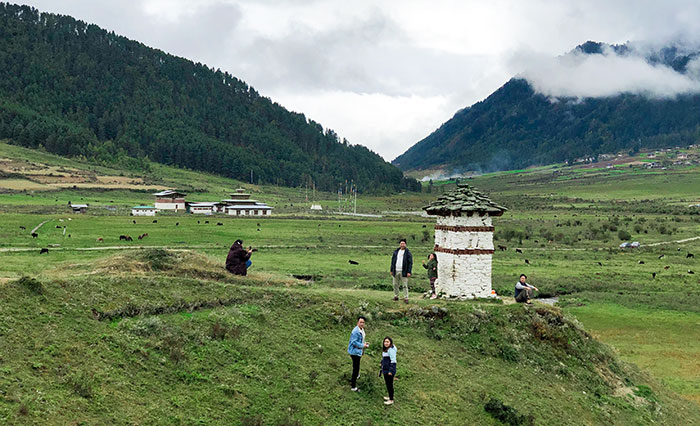18 black-necked cranes have arrived in Phobjikha valley so far
Yangchen C Rinzin
Phobjikha valley in Wangdue is becoming busier these days with the valley becoming a popular holiday destination for many local tourists.
The arrival of local tourists is good news for people of the valley, as it is helping the revival of homestay business after Covid-19 pandemic kept homestay out of business.
Homestay owners shared that the arrival of local tourists are keeping the business afloat although it is yet to pick up signally.
Owners were not comfortable to welcome people at the beginning of the pandemic days. The valley was closed to visitors in mid-May. Had it not been for the pandemic, Phobjikha valley would be filled with tourists because of the arrival of black-necked cranes and Gangtey Tsechu at this time.
With the arrival of black-necked cranes people of Phobji and Gangtey are seeing many local tourists visiting the valley. An increasing number of people are visiting the place as a gateway during weekends or public holidays, or to see Karma, an injured crane.
A total of 18 black-necked cranes have arrived in Phobjikha valley as of yesterday. The valley received the first group of cranes (four adults and a juvenile) in the afternoon of November 7. The cranes usually leave by the end of February.
With the arrival of birds come the tourists. Homestay owners are receiving calls from various people enquiring about the availability of rooms, according to owners.
Homestay owner, Yangka, who have received about five groups of visitors so far, said that the pandemic had hit business hard but now villagers were witnessing improved situation. Yangka has made about Nu 40,000 from homestay so far.
“Many Bhutanese are visiting Phobjikha valley, and it’s helping us. Otherwise, we were doing farming as an alternative business after the business was affected,” said Yangka.
Phobjikha valley is famous for growing turnip, buckwheat and potato.
Homestays are slowly seeing an increase in visitors during weekdays too who come to visit the valley for a day and return.
Homestays are operated by villagers where they charge Nu 1,000-1,200 including three meals for per person per night and a very few homestays charge Nu 300-700 per person per night.
Lhakya, another homestay owner, said he received three groups in one day and had to share one group with another homestay because he could not accommodate them all. “Although we are not making a profit at least we’re receiving guests to run the homestay. This is helping us to keep business running.”
Earlier, the homestay owners used to charge about Nu 1,300 for Bhutanese and 1,700 for tourists and make about Nu 300,000 in a year.
Owners charge about Nu 200-500 for hot-stone bath and packed lunch for guests.
Homestay owner, Tandin Wangchuk, said that although Bhutanese tourists visited Phobjikha during the off-season, it was the first time they had seen an increasing number of local tourists visiting the valley. “It was calm during the lockdown, and now the valley is becoming lively with Bhutanese visiting the place. But we hope that visitors are practising health protocols, as we see visitors without a facemask.”
There are about 33 hotels and homestays in Phobjikha.


